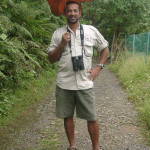The Jungle-Wallah of Langkawi
Irshad Mobarak, also known as “The Jungle-Wallah of Langkawi”, is well known for his passion and enthusiasm towards nature and the environment. “CARROL LAWRENCE” tells us about a self taught naturalist who has dedicated his time to promote conservation on Langkawi Island off the northwestern coast of Peninsula Malaysia.
A visit to the beautiful island of Tioman resulted in a dramatic lifestyle change for Irshad Mobarak. He was so captivated with the natural beauty this little island off the coasts of Malaysia had to offer, that he made a drastic decision to quit his job with a major bank in Kuala Lumpur and explore Malaysia. His travels soon took him to another beautiful island called Langkawi, where he found his niche and has spent the last 16 years.
Irshad is the resident naturalist at a leading resort, his nature programmes are actually a crash course on enjoying and appreciating the beauty and lessons that nature has to offer. His passion for nature and his enthusiasm has made him a well known figure amongst local and foreign tourists. The nickname “The Jungle-Wallah of Langkawi” has stuck to him as he himself professes that he feels out of place anywhere else. This self taught naturalist is a store house of knowledge of the island’s ecosystem. He is more than happy to share his knowledge in the hope that through education and awareness more people will come onboard to help preserve our beautiful but fragile environment.
Langkawi was officially declared the 52nd UNESCO Geopark on the 1st of June 2007. It has the oldest geological formation in Malaysia – the Machinchang Formation which dates back to more than 550 million years. The main criterion for achieving UNESCO’s geopark status “is an area with a geological heritage of significance, with a coherent and strong management structure and where a sustainable economic development strategy is in place”. It is an honour that Langkawi Geopark is now an official term used on the official tourism portal.
In 2003, a Scientific and Heritage Expedition found many new species, as well as others that had previously been considered extinct. However, the study also concluded that Langkawi has lost 48 percent of its natural habitat, resulting in the island becoming fragmented. Thus, wildlife is confined to small areas to compete for food and space. There is an increase in species inbreeding which reduces genetic variation and robustness. All of which eventually lead to species extinction.
Irshad’s main fear is that the island’s development has fragmented and isolated the natural habitat on Langkawi. His main concern is that rate of development on the island has detrimental effects to the wildlife and marine ecosystem. He states that, “Ninety percent of all extinctions happen on islands. Many endangered and endemic species could be wiped out over the next few years”. He has been lobbying for wildlife corridors connecting these fragmented and isolated habitats to be planned in the overall island’s development plans.
He is a proactive member of an environmental group. He works with the local community on education and awareness programmes to educate fishermen on sustainable fishing, and promotes conservation awareness amongst both islanders and tourists alike.
Irshad’s passion and dedication for safeguarding the environment has been recognized. He has been named one of DiGi’s Amazing Malaysians for 2007. He will lead a project to “Build Wildlife Corridors in Langkawi” which will involve 100 school children from five schools in Langkawi.
This project will see the children planting trees along the edges of the present natural habitats and along main roads. The children will also learn about the fragility of the island’s ecosystem and will be introduced to ways in which it can be rehabilitated.
At the discovery launch, Stefan Carlsson, DiGi’s Chief Financial Officer participated in all the activities with great enthusiasm. He said that “I have learnt so much in such a short time and am positive that over the next six months, we will be creating a large number of young and conscientious environmentalists”.
The modules for the project, which include wildlife rangers, tree doctors and nature’s scribes, have been developed with the assistance of the Malaysian Nature Society (MNS) Education Unit. Irshad and the MNS team will conduct various activities with the participating students over the next six months.
It might seem like a cry in the wilderness but as aptly stated by Irshad, “It is man’s social, moral and spiritual responsibility to protect what our Maker has given us. Our deepest responsibility as a human being is to take care of what we have”. If every individual heeds the call to become ‘environment stewards’, they will find a way to help protect the environment.
by CARROL LAWRENCE for

 Previous Post
Previous Post Next Post
Next Post







